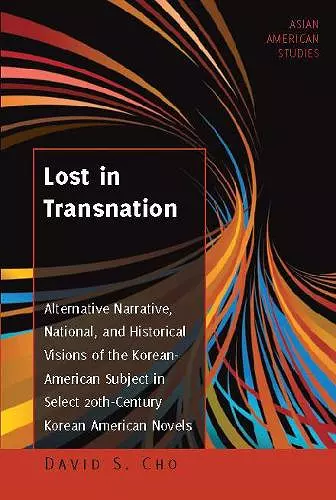Lost in Transnation
Alternative Narrative, National, and Historical Visions of the Korean-American Subject in Select 20th-Century Korean American Novels
Format:Hardback
Publisher:Peter Lang Publishing Inc
Published:22nd Feb '17
Currently unavailable, and unfortunately no date known when it will be back

This volume examines the engagement with national histories, citizenship, and the larger transnational contexts in the narrative plot lines in selected twentieth-century Korean American novels. Critics have often expected, or even demanded, that the Korean American novel present the ideal and coherent American citizen-subject in a linear bildungsroman plotline.
Many novels – Younghill Kang’s East Goes West, Theresa Hak Kyung Cha’s Dictee, Chang-rae Lee’s A Gesture Life, to name a few – do deal with the idea of an “American identity”, however, they consistently problematize such identification through multiple and conflicting national memories, historic eras, and geopolitical terrains. The novels are typically set in contemporary America, but they often refer either to the regional context and era of Japan’s colonization of Korea (1910–1945) or the Korean War (1950–1953). The novels’ characters are “lost in transnation”, contextualizing the multiple and multiply-interrelated national contexts and time periods that have formed immigrants and Korean Americans in the twentieth century.
“David S. Cho’s subjectless history of the Asian American novel is ground breaking. In order to bring out the diversity of Asian American experiences and identities in modern American English writing, he adopts the most logical orientation to this history. He avoids presenting an essentialized Asian American identity or experience, notwithstanding its hybridity. He resolves rather to present the conditions pertaining to the different migrant experiences to throw light on the underlying cultural and ideological tensions, in the fashion of non-representational thinking. The approach liberates him to bring out the politics and aesthetics of his chosen works with sensitive analysis and ethical complexity.” «Suresh Canagarajah, Pennsylvania State University»
“What early Korean American novelists deeply portray, scholar David S. Cho explains of the Asian American experience whether ‘born, adopted, or naturalized,’ is a complex of irony, the geopolitics of narration and being, and the DuBoisian two-ness, warring souls (East vs. sometimes East or West) caught out-of-native places and into a modern awareness of new terrains forced to navigate stereotyping or passing while weighing the honor of heritage and carving lives and identities both visible and invisible. With erudite insights, Cho charts cogent global connections—at once cultural, historical, personal, and political—for readers’ greater appreciation of the perhaps unfamiliar landscapes of these early Korean-American novelists’ achievement.” «Mona Lisa Saloy, Dillard University of New Orleans»
“In «Lost in Translation», the critic and poet David S. Cho shows how Theresa Hak Kyung Cha, Younghill Kang, and Chang-rae Lee emerged as notable literary figures in the United States. But rather than simply assess their contributions within the American canon, he also discusses their complex and nuanced understandings of American, French and Japanese colonialism, identity, and resistance in Korea and the Korean diaspora. The result is an important monograph on the local and global dimensions of Korean American literature.” «Keith L. Camacho, University of California, Los Angeles»
“Through an exploration of the works of Younghill Kang, Chang-rae Lee, and Theresa Hak Kyung Cha, David S. Cho illustrates the diverse imaginings and articulations of the Korean diasporic figure. His reading of these texts reveal complex characters who stand at the intersection of race, gender, nation, global dynamics, different historical moments, and historical memory—rather than ones that can be cast simply along national lines. As such, «Lost in Transnation» is not only an important contribution to the study of Korean American literature, but also raises significant questions on the Korean American figure, positioning, and identity more generally.” «Hanmee Kim, Wheaton College»
ISBN: 9781433112720
Dimensions: unknown
Weight: 370g
178 pages
New edition